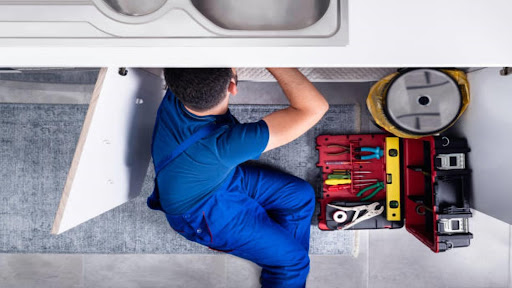Who is a plumbing contractor?
A plumbing contractor is a professional who is responsible for installing, repairing, and maintaining plumbing systems in residential, commercial, and industrial buildings. These professionals play a crucial role in ensuring that buildings have safe and efficient plumbing systems, and they may work with a wide range of materials and technologies, including pipes, fittings, water heaters, and sewage systems.
At InsideAdvisorPro, they offer amazing marketing services for plumbing contractors and companies.
Plumber vs Plumbing Contractor
Plumbers typically work on residential and commercial projects, installing and repairing pipes, fixtures, and appliances. They may also be responsible for the maintenance and repair of plumbing systems in buildings. Plumbers use a variety of tools, including pipe wrenches, pipe cutters, plumbing snakes, and pipe-bending machines, to install and repair plumbing systems.
Plumbing contractors, on the other hand, generally oversee the work of plumbers and other trade professionals on construction or renovation projects. They may also offer design and planning services for new construction or remodeling projects. Plumbing contractors may work with a variety of materials, including copper, steel, and plastic, to install and repair plumbing systems.
In summary, the main difference between a plumber and a plumbing contractor is that a plumber is a tradesperson who focuses on the installation and maintenance of plumbing systems, while a plumbing contractor is a business owner or employee who contracts to provide plumbing services to other businesses or individuals.
If you’re interested in becoming a plumbing contractor, here are some steps you can take:
Steps To Becoming A Plumbing Contractor
Determine the specific requirements for becoming a plumbing contractor in your state or jurisdiction.
The first step in becoming a plumbing contractor is to understand the specific requirements for working in your state or jurisdiction. These requirements may vary depending on where you live, but they often include obtaining a license, completing a certain amount of education or training, and passing exams.
To find out the specific requirements in your area, you can contact your state’s licensing board or professional association. They should be able to provide you with information on the steps you need to take to become a licensed plumbing contractor.
Gain the necessary education and training.
To become a plumbing contractor, you’ll need to have a solid foundation of knowledge and skills in the field. There are a few different ways you can gain this education and training:
- Apprenticeship programs: Many plumbing contractors start their careers by completing an apprenticeship program. These programs typically last for several years and combine on-the-job training with classroom instruction. During an apprenticeship, you’ll work under the supervision of an experienced plumbing contractor and learn the ins and outs of the trade. You’ll also have the opportunity to earn a wage while you learn.
- Vocational programs: Another option is to enrol in a vocational program at a community college or technical school. These programs often focus on hands-on learning and can prepare you for a career as a plumbing contractor.
- College degree programs: Some plumbing contractors choose to earn a degree in a related field, such as construction management or engineering. While a degree isn’t necessarily required to become a plumbing contractor, it can provide you with a broader understanding of the industry and may make it easier to advance in your career.
Obtain any required licenses or certifications.
Once you’ve gained the necessary education and training, you’ll need to obtain any required licenses or certifications. This may involve completing continuing education courses and passing exams.
To find out what licenses or certifications are required in your state or jurisdiction, you can contact your state’s licensing board or professional association. They should be able to provide you with information on the specific requirements you need to meet.
Gain practical experience as a plumbing contractor.
After you’ve obtained the necessary licenses and certifications, it’s time to start building your practical experience as a plumbing contractor. There are a few different ways you can do this:
- Work as an employee or apprentice for an established plumbing company: One option is to work as an employee or apprentice for an established plumbing company. This can be a great way to learn the ropes and gain valuable experience. You’ll have the opportunity to work with experienced professionals and learn from them, and you’ll also have the security of a regular paycheck.
- Start your own business: If you’re ready to take the plunge and start your own business, you’ll need to consider a few key factors, such as funding, insurance, and marketing. You may also want to consider hiring employees or apprentices to help you with your workload. Starting your own business can be challenging, but it can also be very rewarding, as you’ll have the opportunity to be your own boss and build your own company.
Develop a strong portfolio of work and references.
As you gain experience as a plumbing contractor, it’s important to develop a strong portfolio of work and references. This can help you showcase your skills and abilities to potential clients and employers, and it can also help you stand out in a competitive job market.
To build your portfolio, you can include photos and descriptions of your completed projects, as well as any relevant certifications or licenses you’ve obtained. You can also ask satisfied clients or colleagues to provide you with written or verbal references that you can include in your portfolio.
Consider obtaining additional certifications or specialized training.
To further differentiate yourself in the job market and stay up-to-date on the latest industry trends, you may want to consider obtaining additional certifications or specialized training. This could include earning a certification in a specific area of plumbing, such as green plumbing or plumbing for commercial buildings.
You can find out about available certifications and specialized training programs by contacting professional associations or trade organizations. They should be able to provide you with information on the specific requirements and benefits of these programs. Some of these programs include;
Journeyman Plumbing Certification: This certification demonstrates that you have a certain level of knowledge and experience in the field.
Master plumber certification: This is the highest level of certification available, and it typically requires passing a more advanced exam and having a certain amount of work experience.
Green plumbing certification: This certification demonstrates that you are proficient in sustainable plumbing practices and can help you tap into a growing market for eco-friendly services.
Stay up-to-date on industry trends and regulations, and continually seek out opportunities for professional development.
To succeed as a plumbing contractor, it’s important to stay up-to-date on the latest industry trends and regulations. This can help you to stay competitive and ensure that you’re providing the best possible service to your clients.
There are a few different ways you can stay informed:
- Subscribe to industry publications: Many trade organizations and professional associations publish newsletters or magazines that provide information on the latest trends and developments in the plumbing industry.
- Attend conferences and workshops: Conferences and workshops can be a great way to learn about new technologies and techniques, and to network with other professionals in the field.
- Participate in continuing education programs: Many states require plumbing contractors to complete continuing education courses in order to maintain their licenses. These courses can provide you with valuable information and skills that can help you to stay up-to-date and competitive in the job market.
Tips to Starting a Plumbing Contractor Business
- Get the required education and training; Education and training will give you the skills and knowledge you need to perform plumbing services safely and effectively.
- Obtain the required licensing and insurance; To get your plumbing license, you will need to pass a state-approved exam and meet the state’s education and training requirements. You will also need to carry liability insurance and workers’ compensation insurance to protect you and your business from financial losses.
- Make a business model. A business plan is a blueprint that defines your corporate goals, target audience, financial predictions, and marketing approach. It will assist you in being focused and organized when you begin your plumbing business.
- Seek financing: Starting a plumbing business typically requires a significant investment in tools, equipment, and marketing. If you don’t have the capital to fund your business, you may need to seek financing through loans, grants, or crowdfunding.
- Market your services: Marketing your plumbing business is crucial to attracting and retaining customers. Consider using a website, social media, referrals, and networking to promote your services.
- Manage your finances: Managing your finances is crucial to the success of your plumbing business. Keep track of your expenses, set financial goals, monitor your cash flow, and seek professional advice when needed.
Conclusion
Becoming a plumbing contractor can be a rewarding career path for those who enjoy working with their hands, solving problems, and helping others. While it may require some training and education, the process of becoming a plumbing contractor is relatively straightforward and can lead to a stable, well-paying job.
In conclusion, becoming a plumbing contractor requires a combination of education, training, and licensing. It is a challenging but rewarding career that allows you to work with your hands, solve problems, and make a difference in people’s lives. By following the steps outlined above, you can start your journey towards becoming a plumbing contractor and building a successful plumbing business.




